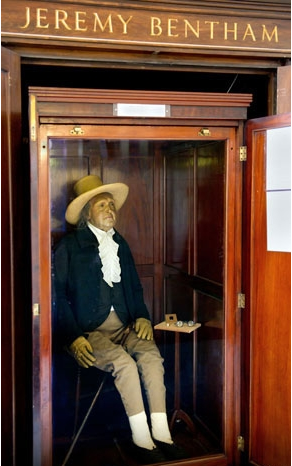
Science and technology.
科技。
Moral philosophy.
道德哲學。
Goodness has nothing to do with it.
無關善惡。
Utilitarians are not nice people.
功利主義者并不是好人。
IN THE grand scheme of things Jeremy Bentham and John Stuart Mill are normally thought of as good guys. Between them, they came up with the ethical theory known as utilitarianism. The goal of this theory is encapsulated in Bentham's aphorism that "the greatest happiness of the greatest number is the foundation of morals and legislation."
從歷史洪流的角度來看,杰里米·貝薩姆和約翰·斯圖阿特·密爾通常都被認為是好人。他們一起合作建立了現在被稱為功利主義的道德理論。該理論的核心目的可以被貝薩姆的一句格言很好地概括"道德和立法的基礎在于讓最多的人最大程度的幸福"
Which all sounds fine and dandy until you start applying it to particular cases. A utilitarian, for example, might approve of the occasional torture of suspected terrorists-for the greater happiness of everyone else, you understand. That type of observation has led Daniel Bartels at Columbia University and David Pizarro at Cornell to ask what sort of people actually do have a utilitarian outlook on life. Their answers, just published in Cognition, are not comfortable.
聽上去很不錯,但當你開始把這套理論應用在具體事件上時問題就出來了。比方說,功利主義者可能贊成對恐怖主義疑犯用刑。大家都明白,這是為了其它所有人好。哥倫比亞大學的丹尼爾·巴特爾斯和康奈爾大學的大衛·皮扎羅受到類似這樣的觀察啟發,提出了哪一類型的人對生活的看法最接近功利主義這一有趣問題。他們的論文最近在認知科學上發表,其中得到的結論讓人不安。
One of the classic techniques used to measure a person's willingness to behave in a utilitarian way is known as trolleyology. The subject of the study is challenged with thought experiments involving a runaway railway trolley or train carriage. All involve choices, each of which leads to people's deaths. For example: there are five railway workmen in the path of a runaway carriage. The men will surely be killed unless the subject of the experiment, a bystander in the story, does something. The subject is told he is on a bridge over the tracks. Next to him is a big, heavy stranger. The subject is informed that his own body would be too light to stop the train, but that if he pushes the stranger onto the tracks, the stranger's large body will stop the train and save the five lives. That, unfortunately, would kill the stranger.
測量一個人有多大的意愿以功利主義方式行事的一個傳統方法是電車實驗。參加者進行一個想象實驗,實驗里有一節失控的有軌電車或火車車廂。該實驗有很多版本,不管哪一個都要求參加者進行選擇,而且不管怎么選都會有人死亡。例如:有五個工人在失控車廂前方的軌道上。如果實驗參加者作為故事中的一個旁觀者不進行干涉這五個人就死定了。參加者被告知他在鐵道上方的一座橋上,身邊有一個身材肥胖的陌生人,同時參加者知道自己的體重太輕,無法停止火車,但如果把那個陌生人推下去,他的巨大身軀將會停止火車,讓五個工人得救。不幸的是這么做會殺死該陌生人。
Dr Bartels and Dr Pizarro knew from previous research that around 90% of people refuse the utilitarian act of killing one individual to save five. What no one had previously inquired about, though, was the nature of the remaining 10%.
巴特爾斯博士和皮扎羅博士從之前的研究中得知大約90%的參加者會拒絕殺死一個陌生人救出五個人的功利主義行為。但是之前的研究沒人提出過剩下的10%人的性格這一問題。
To find out, the two researchers gave 208 undergraduates a battery of trolleyological tests and measured, on a four-point scale, how utilitarian their responses were. Participants were also asked to respond to a series of statements intended to get a sense of their individual psychologies. These statements included, "I like to see fist fights", "The best way to handle people is to tell them what they want to hear", and "When you really think about it, life is not worth the effort of getting up in the morning". Each was asked to indicate, for each statement, where his views lay on a continuum that had "strongly agree" at one end and "strongly disagree" at the other. These statements, and others like them, were designed to measure, respectively, psychopathy, Machiavellianism and a person's sense of how meaningful life is.
為了找出結果,這兩個研究者對208個大學生進行了一系列電車實驗,并以一到四分的機制來給他們的答案中的功利主義成分打分。參加者也要進行一系列分析個人心理的測試。測試包括這些問題,"我喜歡看人打架","應付別人最好的辦法就是說他們想聽的話",以及"認真想想的話,生活沒什么意思,每天起來真不值"。參加者要在一個連續的尺度上標出他們對每一個問題的看法,從"完全同意"到"完全不同意"。這三個問題按次序分別是為了測量一個人的冷血程度,厚黑程度以及他覺得生活是否有意義的程度,其它問題也是圍繞著測量這三個方面而設計的。
Dr Bartels and Dr Pizarro then correlated the results from the trolleyology with those from the personality tests. They found a strong link between utilitarian answers to moral dilemmas (push the fat guy off the bridge) and personalities that were psychopathic, Machiavellian or tended to view life as meaningless. Utilitarians, this suggests, may add to the sum of human happiness, but they are not very happy people themselves.
巴特爾斯博士和皮扎羅博士然后開始尋找人格測試和電車實驗結果的相關性。他們發現在面對道德兩難(將胖子推下去)時回答體現功利主義的參加者和冷血變態心理,厚黑主義以及覺得生活沒意義的想法有很強的關聯。這表示雖然功利主義者能夠增加人類整體的幸福值,但他們自己并不是什么快樂的人。
That does not make utilitarianism wrong. Crafting legislation-one of the main things that Bentham and Mill wanted to improve-inevitably involves riding roughshod over someone's interests. Utilitarianism provides a plausible framework for deciding who should get trampled. The results obtained by Dr Bartels and Dr Pizarro do, though, raise questions about the type of people who you want making the laws. Psychopathic, Machiavellian misanthropes? Apparently, yes.
這并不意味著功利主義是錯誤的。任何法律的制定-當年貝薩姆和密爾希望借其理論能夠有所助益的主要行為之一-不可避免的需要犧牲一部分人的利益。功利主義提供了一個比較合理的框架來決定應該犧牲誰的利益。不過巴特爾斯博士和皮扎羅博士的研究提出了應該讓哪種人來制定法律的質疑。冷血,厚黑的厭惡人類者?從表面上來看,是的。











